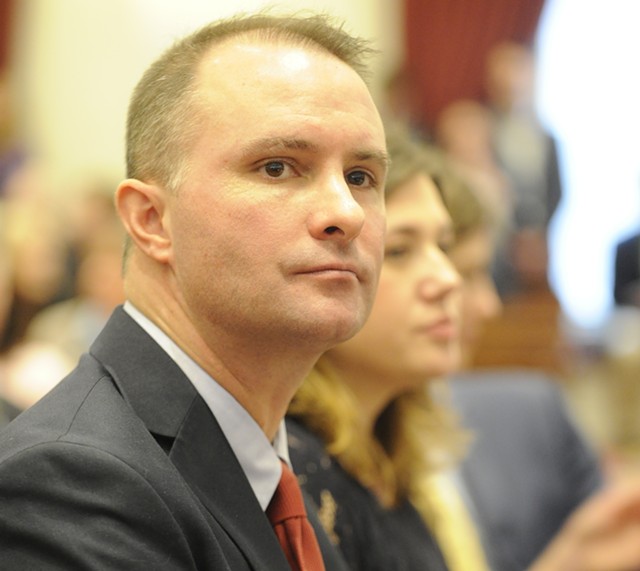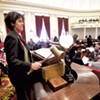Switch to the mobile version of this page.
Vermont's Independent Voice
- News
- Arts+Culture
- Home+Design
- Food
- Cannabis
- Music
- On Screen
- Events
- Jobs
- Obituaries
- Classifieds
- Personals
Browse News
Departments
-
Housing Crisis

Barre to Sell Two Parking Lots for…
-
News

Vermont Awarded $62 Million in Federal Solar…
-
News

Property Tax Relief Bill Sparks Partisan Feud
- Town of Roxbury Sues Over Budget Vote That Could Close Its School Education 0
- More Vermont Seniors Are Working, Due to Financial Need or Choice. They May Help Plug the Labor Gap. This Old State 0
- Burlington Mayor Emma Mulvaney-Stanak’s First Term Starts With Major Staffing and Spending Decisions Politics 0
Browse Arts + Culture
View All
local resources
Browse Food + Drink
View All
Browse Cannabis
View All
-
Culture

'Cannasations' Podcaster Kris Brown Aims to 'Humanize'…
-
True 802

A Burlington Cannabis Shop Plans to Host…
-
Business

Judge Tosses Burlington Cannabiz Owner's Lawsuit
-
Health + Fitness

Vermont's Cannabis Nurse Hotline Answers Health Questions…
-
Business

Waterbury Couple Buy Rare Vermont Cannabis License
Browse Music
View All
Browse On Screen
Browse Events
View All
Quick Links
Browse Classifieds
Browse Personals
-

If you're looking for "I Spys," dating or LTRs, this is your scene.
View Profiles
Special Reports
Pubs+More
Friday, April 7, 2017
Law Enforcement Suit Challenges What Vermont’s AG Can Keep Confidential
Posted By Alicia Freese on Fri, Apr 7, 2017 at 12:15 PM
A lawsuit filed by a free-market nonprofit in Washington, D.C., is raising questions about how Vermont’s Office of the Attorney General responds to public records requests.
Last summer, the Energy & Environment Legal Institute asked for information from multiple attorneys general about a potential multi-state investigation into ExxonMobil for spreading misinformation about climate change. The states had signed a pledge not to disclose documents without permission from the group of attorneys general, and the institute wanted records of any requests to share information.
Some states complied with the institute’s request, but Vermont denied it, and the institute sued.
In Washington Superior Court on March 28, chief assistant attorney general Bill Griffin argued that his office acts as the State of Vermont’s legal counsel, and the state’s rules of professional conduct require lawyers to keep communications confidential unless it’s in their client’s interest to release them. The state’s public records act contains an exemption for professionals who are bound by these rules of conduct.
Judge Mary Miles Teachout sought to clarify Griffin's position several times throughout the hearing. According to the court transcript, she said, “Your argument is that the exemption that you’re relying on is really much broader than that. It’s that the Attorney General’s Office is, as the State of Vermont is a client; therefore, anything with the Attorney General’s Office does or has in its possession is exempt from the public records act unless you choose to reveal it. I understand that that’s your argument.”
Griffin, a 35-year veteran of the office, responded, “That is correct, and it's because we’re a law office by statute.”
He has since insisted that’s not exactly what he meant. “So I took the question to mean legal files, not the shopping list on my desk or an expense account or a budget document we had provided to the House Appropriations [Committee].”
Attorney General T.J. Donovan brought Griffin, assistant attorney general Sarah London and deputy attorney general Joshua Diamond into his corner office Thursday afternoon to address the situation with Seven Days.
“We have released records, so clearly, you know, the policy of the office is not to take the position that all records are exempt from the public records law,” Donovan maintained.
But Griffin’s argument in court would seem to imply that there would be a legal justification should the office ever choose to adopt such a policy.
Diamond and the others repeatedly disputed the suggestion throughout the 45-minute interview. “This was in the context of a particular argument on a particular request, and you’re hearing from us today what that context is to provide clarification for those arguments,” Diamond said. “So for you to take a line out of that transcript without that full context and read broader meaning into it really is unfair and unjust.”
However, that appears to be how the judge and the plaintiffs interpreted Griffin’s comments. The Energy & Environment Legal Institute’s lawyer, Matthew Hardin, said in an interview, “He believes basically that every scrap of paper in the Attorney General’s Office is exempt from the Vermont public record act, and that’s the start of every analysis.”
Griffin made a second statement at that court hearing that has garnered attention. He was explaining what his office does when public records requests come in. “One thing we might consider is, ‘Where are they — who are these people? Where are they going with this?’ And we google them and we find, you know, coal or Exxon or whatever — and so we’re thinking this is — we better — we better give this some thought before we — before we share information with this entity.”
He continued: “Or it might be a news organization and we think, Well, what are they going to do with it? Well, they’re going to publish it to the world. So that would be — I mean, that would be my mental impression and, you know, let’s exercise some caution.”
Vermont case law has established that agencies can’t take into account who is making the request — or why — when weighing access to public documents.
In a later interview, Griffin said his hypothetical assumed the request was for confidential legal files, and in that case, it’s his duty to determine whether it’s in the state’s interest to release the information.
Who’s making the request is “maybe one of 75 things that helps the lawyer figure out what’s in it for the state of Vermont to publish this information,” he said.
Donovan later backed him up: “To say, ‘Who is this from and what are they asking for?’ is a perfectly normal response. This idea that by somehow googling the organization is an act of malice or is a devious act is — it’s providing context.”
Griffin also pointed to comments he made at the end of the court hearing: “We agree totally with the suggestion that the access-to-records law applies equally to all of — all requesters. I didn’t mean to suggest otherwise and I’m not suggesting otherwise.”
Hardin takes a different view: “[Griffin] has a theory that allows him to essentially discriminate on the basis of who the requester is. Even if the law says what Bill Griffin thinks it says, I think it would be unconstitutional.”
Even if Vermonters don’t share the institute’s views, Hardin recommends they pay attention to his client’s legal battle. “It’s an interesting question for a Vermonter because this shapes the future of the Vermont public records law and how it applies.”
Last summer, the Energy & Environment Legal Institute asked for information from multiple attorneys general about a potential multi-state investigation into ExxonMobil for spreading misinformation about climate change. The states had signed a pledge not to disclose documents without permission from the group of attorneys general, and the institute wanted records of any requests to share information.
Some states complied with the institute’s request, but Vermont denied it, and the institute sued.
In Washington Superior Court on March 28, chief assistant attorney general Bill Griffin argued that his office acts as the State of Vermont’s legal counsel, and the state’s rules of professional conduct require lawyers to keep communications confidential unless it’s in their client’s interest to release them. The state’s public records act contains an exemption for professionals who are bound by these rules of conduct.
Judge Mary Miles Teachout sought to clarify Griffin's position several times throughout the hearing. According to the court transcript, she said, “Your argument is that the exemption that you’re relying on is really much broader than that. It’s that the Attorney General’s Office is, as the State of Vermont is a client; therefore, anything with the Attorney General’s Office does or has in its possession is exempt from the public records act unless you choose to reveal it. I understand that that’s your argument.”
Griffin, a 35-year veteran of the office, responded, “That is correct, and it's because we’re a law office by statute.”
He has since insisted that’s not exactly what he meant. “So I took the question to mean legal files, not the shopping list on my desk or an expense account or a budget document we had provided to the House Appropriations [Committee].”
Attorney General T.J. Donovan brought Griffin, assistant attorney general Sarah London and deputy attorney general Joshua Diamond into his corner office Thursday afternoon to address the situation with Seven Days.
“We have released records, so clearly, you know, the policy of the office is not to take the position that all records are exempt from the public records law,” Donovan maintained.
But Griffin’s argument in court would seem to imply that there would be a legal justification should the office ever choose to adopt such a policy.
Diamond and the others repeatedly disputed the suggestion throughout the 45-minute interview. “This was in the context of a particular argument on a particular request, and you’re hearing from us today what that context is to provide clarification for those arguments,” Diamond said. “So for you to take a line out of that transcript without that full context and read broader meaning into it really is unfair and unjust.”
However, that appears to be how the judge and the plaintiffs interpreted Griffin’s comments. The Energy & Environment Legal Institute’s lawyer, Matthew Hardin, said in an interview, “He believes basically that every scrap of paper in the Attorney General’s Office is exempt from the Vermont public record act, and that’s the start of every analysis.”
Griffin made a second statement at that court hearing that has garnered attention. He was explaining what his office does when public records requests come in. “One thing we might consider is, ‘Where are they — who are these people? Where are they going with this?’ And we google them and we find, you know, coal or Exxon or whatever — and so we’re thinking this is — we better — we better give this some thought before we — before we share information with this entity.”
He continued: “Or it might be a news organization and we think, Well, what are they going to do with it? Well, they’re going to publish it to the world. So that would be — I mean, that would be my mental impression and, you know, let’s exercise some caution.”
Vermont case law has established that agencies can’t take into account who is making the request — or why — when weighing access to public documents.
In a later interview, Griffin said his hypothetical assumed the request was for confidential legal files, and in that case, it’s his duty to determine whether it’s in the state’s interest to release the information.
Who’s making the request is “maybe one of 75 things that helps the lawyer figure out what’s in it for the state of Vermont to publish this information,” he said.
Donovan later backed him up: “To say, ‘Who is this from and what are they asking for?’ is a perfectly normal response. This idea that by somehow googling the organization is an act of malice or is a devious act is — it’s providing context.”
Griffin also pointed to comments he made at the end of the court hearing: “We agree totally with the suggestion that the access-to-records law applies equally to all of — all requesters. I didn’t mean to suggest otherwise and I’m not suggesting otherwise.”
Hardin takes a different view: “[Griffin] has a theory that allows him to essentially discriminate on the basis of who the requester is. Even if the law says what Bill Griffin thinks it says, I think it would be unconstitutional.”
Even if Vermonters don’t share the institute’s views, Hardin recommends they pay attention to his client’s legal battle. “It’s an interesting question for a Vermonter because this shapes the future of the Vermont public records law and how it applies.”
Tags: T.J. Donovan, public records, Energy & Environment Legal Institute, Vermont attorney general, Image, Web Only
Comments
Showing 1-1 of 1
Comments are closed.
Since 2014, Seven Days has allowed readers to comment on all stories posted on our website. While we’ve appreciated the suggestions and insights, the time has come to shut them down — at least temporarily.
While we champion free speech, facts are a matter of life and death during the coronavirus pandemic, and right now Seven Days is prioritizing the production of responsible journalism over moderating online debates between readers.
To criticize, correct or praise our reporting, please send us a letter to the editor. Or send us a tip. We’ll check it out and report the results.
Online comments may return when we have better tech tools for managing them. Thanks for reading.
Related Stories
About The Author

Alicia Freese
Bio:
Alicia Freese was a Seven Days staff writer from 2014 through 2018.
Alicia Freese was a Seven Days staff writer from 2014 through 2018.







































